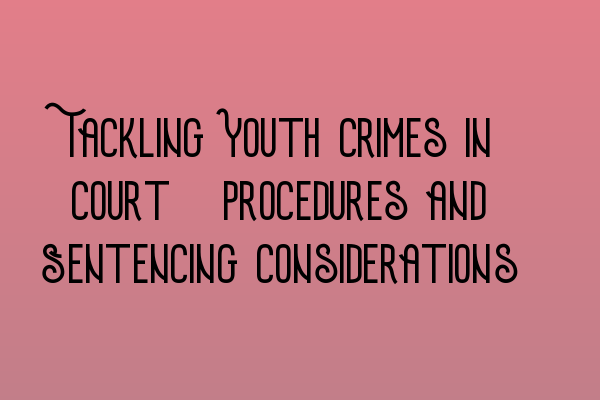Tackling Youth Crimes in Court: Procedures and Sentencing Considerations
As a solicitor practicing criminal law in the UK, I believe it is crucial to address the issue of youth crimes and discuss the procedures and sentencing considerations involved in tackling them. Youth crimes pose unique challenges, and it is essential to have a comprehensive understanding of the legal framework and approach to ensure justice is served. In this blog post, I will explore the procedures and sentencing considerations for dealing with youth crimes, shedding light on this important aspect of the legal system.
Understanding Youth Crimes
Youth crimes refer to offenses committed by individuals who are under the age of 18. These crimes encompass a wide range of offenses, including theft, vandalism, drug-related offenses, assault, and even more serious crimes such as burglary or robbery. When dealing with youth crimes, the primary objective is not only punishment but also the rehabilitation and reintegration of the young offenders into society.
Procedures in Youth Crime Cases
The procedures followed in youth crime cases differ from those in adult criminal cases. The Youth Justice System in the UK is designed to safeguard the welfare and best interests of young offenders, recognizing their vulnerability and potential for rehabilitation. Here are some key procedures involved in handling youth crimes:
- Arrest: When a youth is suspected of committing a crime, they may be arrested by the police. It is important for the arresting officers to consider the age of the offender and their vulnerability during the arrest process.
- Police Detention: If a youth is arrested, they may be taken into police custody. The police must ensure that the conditions of detention are appropriate for the age and vulnerability of the young offender.
- Interview: The police will conduct an interview with the youth, gathering evidence and information relating to the alleged offense. The interview must be conducted in a manner that takes into account the age and understanding of the young offender.
- Charge or Diversion: After the investigation, the police may decide to charge the young offender with the offense or divert them away from the formal court process. Diversion programs aim to address the underlying causes of the offending behavior and provide appropriate support.
- Court Proceedings: If the case proceeds to court, specific procedures are in place to protect the rights and welfare of the young offender. The court will consider the age, background, and circumstances of the youth when determining the appropriate course of action.
- Sentencing: When it comes to sentencing youth offenders, the focus is on rehabilitation and preventing reoffending. The court will consider a range of factors, including the nature and seriousness of the offense, the young person’s culpability, and their potential for rehabilitation.
Sentencing Considerations
When determining the appropriate sentence for a youth offender, the court takes into account various factors. These factors include:
- The age and maturity of the offender
- The circumstances surrounding the offense
- The impact of the offense on the victim and the community
- The young person’s previous criminal history, if any
- The potential for rehabilitation and reintegration
It is important to note that custodial sentences for youth offenders are considered a last resort. The court will explore other options, such as community-based sentences, restorative justice, counseling, and education programs, which focus on addressing the underlying issues that led to the offending behavior.
Conclusion
Tackling youth crimes requires a balanced approach that considers both the accountability of the young offender and their potential for rehabilitation. The procedures and sentencing considerations in youth crime cases are designed to ensure that justice is served while also prioritizing the welfare and best interests of the young person. As legal professionals, it is our responsibility to navigate these complex cases with compassion, expertise, and a commitment to upholding the principles of justice.
For additional resources on preparing for the SQE 1 and SQE 2 exams or exploring information on related legal topics, consider visiting the following articles:
- SQE 1 Practice Exam Questions
- SQE 1 Practice Mocks FLK1 FLK2
- SQE 2 Preparation Courses
- SQE 1 Preparation Courses
- SRA SQE Exam Dates
Thank you for reading. If you have any legal inquiries or need assistance with criminal law matters, please do not hesitate to contact SQE Criminal Law & Practice Law UK.
